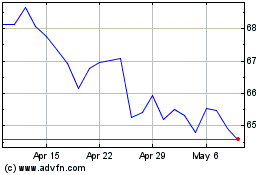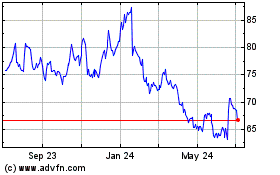By Joseph Walker
This article is being republished as part of our daily
reproduction of WSJ.com articles that also appeared in the U.S.
print edition of The Wall Street Journal (March 3, 2020).
Gilead Sciences Inc. will pay $4.9 billion to buy Forty Seven
Inc., a five-year-old biotech company with a promising blood-cancer
medicine that could be on the market within two years.
Gilead said Monday it has agreed to pay $95.50 a share in cash
for Forty Seven, a nearly 65% premium to Friday's closing price of
$58 for the Menlo Park, Calif., company.
The deal is the first major outright acquisition under Gilead
Chief Executive Daniel O'Day, who took over the company a little
over a year ago with a mandate to jump-start sales growth and turn
around the company's sagging stock price. The transaction will
deepen Gilead's pipeline of cancer drugs.
Gilead, based in Foster City, Calif., is grappling with a sharp
decline in revenue from its hepatitis C drug franchise and the
threat of generic competition to its HIV drugs.
Mr. O'Day said Monday that he will make more deals similar to
the size and scope of Forty Seven, despite calls by some analysts
to buy a larger, established company that would immediately boost
sales and profit.
"At the end of the day, there's no immediate quick fix in this
industry, " Mr. O'Day said in an interview. "Myself and the board
are firmly committed to the long-term strategy of the company."
Yet some analysts expressed disappointment that Gilead didn't do
a deal with a more immediate impact on the company's bottom
line.
Evan Seigerman, a Credit Suisse analyst, in a note to clients,
said: "The company should have undertaken a more transformative
approach to M&A in acquiring an asset or company that would
have impacted revenue and earnings growth over the next couple of
years."
Gilead had sales of $22.45 billion in 2019. This year, sales are
projected to decline 0.2% to $22.4 billion, according to analysts
polled by FactSet.
Mr. O'Day has made acquisitions and partnerships a key plank in
his turnaround strategy for the company, which he has dubbed
"Gilead's next chapter" and includes the ambitious goal of
launching 10 new drugs over the next decade.
Last year, Gilead paid $3.95 billion to form a drug-development
partnership with European-biotech Galapagos NV in addition to
purchasing a 22% stake in the company for $1 billion. The deal gave
Gilead rights to develop and market six experimental drugs already
in clinical trials, including a potential rheumatoid arthritis
treatment called filgotinib.
Filgotinib is now under review by the U.S. Food and Drug
Administration and could be approved this year; analysts project
the drug to reach sales of $1.23 billion in 2025, according to
FactSet.
In buying Forty Seven, Gilead hopes to extend its toehold in the
lucrative and competitive cancer-drug market.
Gilead's most successful cancer drug, Yescarta, uses genetically
engineered immune cells to treat lymphoma and had sales of $456
million last year. Gilead acquired Yescarta in its $11.9 billion
acquisition of Kite Pharma in 2017.
Oncology drugs are attractive for pharmaceutical companies
because they can command high prices and receive relatively fast
regulatory approvals. U.S. spending on cancer drugs more than
doubled to $56.7 billion in 2018 from $27.3 billion in 2013,
according to health-care data provider IQVIA. Development of the
drugs has been aided by scientific advances that enabled a more
precise targeting of genetic mutations that drive tumors.
Forty Seven has one drug, called magrolimab, being tested in
humans. The molecule has shown promising early-stage results in
treating the blood cancers myelodysplastic syndrome and acute
myeloid leukemia in combination with chemotherapy. The drug is part
of a class of medicines known as immunotherapies that harness the
immune system to kill tumor cells.
Tumors sometimes use a protein called CD47 that blocks the
immune system from killing the cancerous cells by sending what
researchers call "don't eat me" signals. Magrolimab is designed to
block the CD47 protein, allowing the immune system to destroy the
cancerous cells.
If ongoing studies continue to be positive, Gilead aims to win
an accelerated approval from the FDA in the latter part of 2022,
Chief Medical Officer Merdad Parsey told analysts on a conference
call to discuss the deal.
"That was one of the key things that [we were] interested in,"
Dr. Parsey said. "The ability to get to market relatively
quickly."
About 14,000 people annually in the U.S. are diagnosed with MDS,
according to the company.
Gilead shares rose 8.7% to $75.40 in Monday trading. The stock
is up about 16% so far this year, driven largely by the potential
of the company's experimental drug remdesivir to treat the Covid-19
virus.
Shares of Forty Seven surged 62% to $93.91.
--Colin Kellaher contributed to this article.
Write to Joseph Walker at joseph.walker@wsj.com
(END) Dow Jones Newswires
March 03, 2020 02:47 ET (07:47 GMT)
Copyright (c) 2020 Dow Jones & Company, Inc.
Gilead Sciences (NASDAQ:GILD)
Historical Stock Chart
From Mar 2024 to Apr 2024

Gilead Sciences (NASDAQ:GILD)
Historical Stock Chart
From Apr 2023 to Apr 2024
